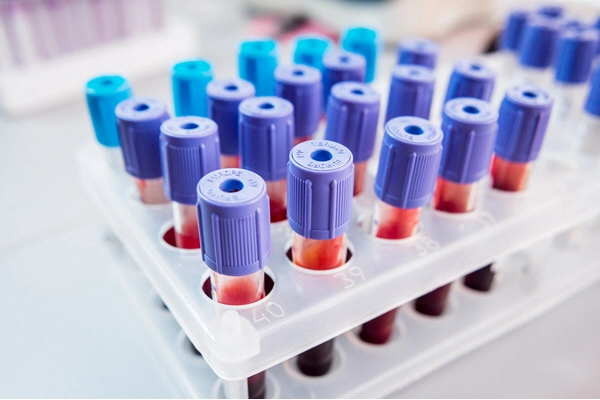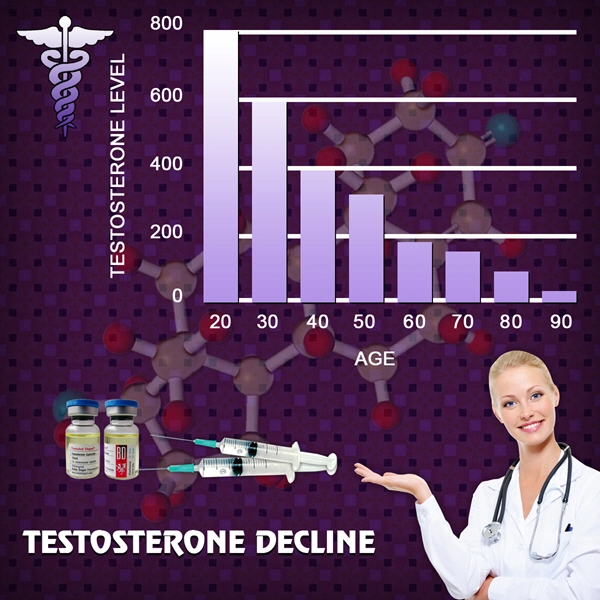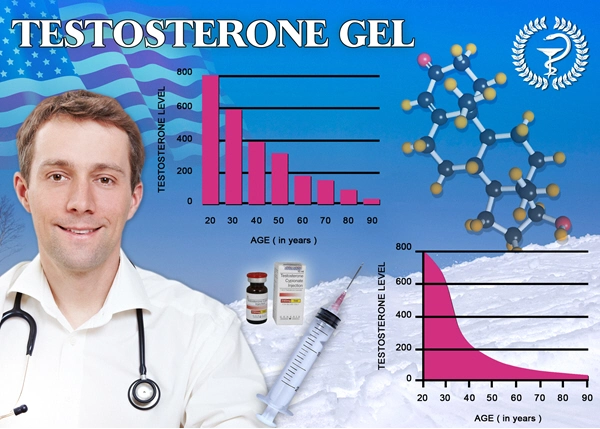Introduction to Testosterone Deficiency Syndrome
Testosterone Deficiency Syndrome (TDS), also known as hypogonadism, is a clinical condition characterized by low levels of testosterone in men, leading to a variety of symptoms that can significantly impact quality of life. In the United States, an increasing number of men are being diagnosed with TDS, a trend that has sparked considerable interest and concern among healthcare professionals and researchers. This article delves into the relationship between chronic illnesses and testosterone levels, focusing on how these conditions contribute to TDS in American males.
The Role of Chronic Illness in Testosterone Decline
Chronic illnesses, such as diabetes, obesity, cardiovascular diseases, and autoimmune disorders, have been identified as significant contributors to the decline in testosterone levels. These conditions can disrupt the hypothalamic-pituitary-gonadal (HPG) axis, which is crucial for the production and regulation of testosterone. For instance, diabetes can lead to insulin resistance, which in turn affects the HPG axis, resulting in lower testosterone production. Similarly, obesity is associated with increased levels of aromatase, an enzyme that converts testosterone to estrogen, further exacerbating testosterone deficiency.
Clinical Manifestations of TDS in American Males
American males with TDS often present with a range of symptoms that can severely affect their daily lives. Common manifestations include reduced libido, erectile dysfunction, fatigue, decreased muscle mass, increased body fat, and mood disturbances such as depression and irritability. These symptoms not only impact physical health but also have profound psychological and social implications, often leading to decreased self-esteem and strained relationships.
Diagnosis and Assessment of TDS
Diagnosing TDS requires a comprehensive approach, including a thorough medical history, physical examination, and laboratory tests. Blood tests to measure total and free testosterone levels are essential for confirming the diagnosis. It is crucial to conduct these tests in the morning, as testosterone levels are typically highest at this time. Additionally, healthcare providers must consider other factors that could influence testosterone levels, such as medications, lifestyle factors, and the presence of chronic illnesses.
Management and Treatment Strategies
The management of TDS in American males involves addressing both the underlying chronic illnesses and the testosterone deficiency itself. Lifestyle modifications, such as weight loss, regular exercise, and a balanced diet, can significantly improve testosterone levels. For those with severe TDS, testosterone replacement therapy (TRT) may be recommended. TRT can be administered through various methods, including injections, gels, patches, and pellets, each with its own set of benefits and potential side effects. It is essential for patients to work closely with their healthcare providers to monitor the effectiveness of TRT and adjust treatment as needed.
The Importance of Awareness and Education
Raising awareness about TDS and its association with chronic illnesses is vital for improving outcomes in American males. Education efforts should focus on encouraging men to seek medical advice if they experience symptoms of TDS and to understand the importance of managing chronic conditions to prevent further testosterone decline. Healthcare providers play a critical role in this process, offering guidance and support to help patients navigate the complexities of TDS and its treatment.
Conclusion: A Call to Action
The impact of chronic illness on testosterone levels and the subsequent development of Testosterone Deficiency Syndrome is a pressing concern for American males. By understanding the underlying mechanisms and implementing effective management strategies, it is possible to mitigate the effects of TDS and enhance the quality of life for affected individuals. As research continues to evolve, it is imperative that healthcare professionals remain vigilant and proactive in addressing this multifaceted health issue.

- Understanding and Managing Testosterone Deficiency Syndrome in American Men [Last Updated On: February 26th, 2025] [Originally Added On: February 26th, 2025]
- Testosterone Deficiency Syndrome: Hormone Therapy Benefits and Considerations for American Males [Last Updated On: March 18th, 2025] [Originally Added On: March 18th, 2025]
- Environmental Toxins Linked to Testosterone Deficiency in American Males: Impacts and Mitigation [Last Updated On: March 18th, 2025] [Originally Added On: March 18th, 2025]
- Stress and Testosterone Deficiency in American Males: Causes, Symptoms, and Management [Last Updated On: March 19th, 2025] [Originally Added On: March 19th, 2025]
- Alcohol's Impact on Testosterone Levels and TDS in American Males: A Comprehensive Analysis [Last Updated On: March 19th, 2025] [Originally Added On: March 19th, 2025]
- Smoking's Impact on Testosterone Deficiency Syndrome in American Males: A Comprehensive Analysis [Last Updated On: March 20th, 2025] [Originally Added On: March 20th, 2025]
- Testosterone Levels: Importance of Regular Check-ups for American Males [Last Updated On: March 20th, 2025] [Originally Added On: March 20th, 2025]
- Testosterone Deficiency in American Men: Impacts on Mood and Holistic Management Strategies [Last Updated On: March 21st, 2025] [Originally Added On: March 21st, 2025]
- Testosterone Deficiency Syndrome: Impact on Muscle Mass and Management Strategies for American Men [Last Updated On: March 21st, 2025] [Originally Added On: March 21st, 2025]
- Testosterone Deficiency Syndrome: Impacts and Management in American Men's Prostate Health [Last Updated On: March 21st, 2025] [Originally Added On: March 21st, 2025]
- Testosterone Deficiency and Sleep Apnea: Impacts and Management for American Males [Last Updated On: March 22nd, 2025] [Originally Added On: March 22nd, 2025]
- Testosterone Deficiency Syndrome: Impacts on Joint Health and Management Strategies [Last Updated On: March 22nd, 2025] [Originally Added On: March 22nd, 2025]
- Understanding and Managing Testosterone Deficiency Syndrome in American Men [Last Updated On: March 22nd, 2025] [Originally Added On: March 22nd, 2025]
- Testosterone Deficiency Syndrome: Impacts on Libido and Mental Health in American Men [Last Updated On: March 22nd, 2025] [Originally Added On: March 22nd, 2025]
- Understanding and Managing Testosterone Deficiency in American Men: Impacts and Solutions [Last Updated On: March 23rd, 2025] [Originally Added On: March 23rd, 2025]
- Testosterone Deficiency and Depression: Impact and Management in American Men [Last Updated On: March 23rd, 2025] [Originally Added On: March 23rd, 2025]
- Diet Soda Consumption Linked to Lower Testosterone Levels in American Men [Last Updated On: March 23rd, 2025] [Originally Added On: March 23rd, 2025]
- Vitamin D's Role in Managing Testosterone Deficiency in American Males [Last Updated On: March 23rd, 2025] [Originally Added On: March 23rd, 2025]
- Ashwagandha: A Natural Remedy for Testosterone Deficiency in American Men [Last Updated On: March 23rd, 2025] [Originally Added On: March 23rd, 2025]
- Testosterone Deficiency Syndrome: Impacts and Management of Skin Health in American Men [Last Updated On: March 23rd, 2025] [Originally Added On: March 23rd, 2025]
- Omega-3 Fatty Acids: A Potential Aid in Managing Testosterone Deficiency in American Males [Last Updated On: March 24th, 2025] [Originally Added On: March 24th, 2025]
- Testosterone Deficiency in American Men: Impacts on Vision and Eye Health [Last Updated On: March 24th, 2025] [Originally Added On: March 24th, 2025]
- Testosterone Deficiency in American Men: Impacts and Management of Hair Loss [Last Updated On: March 24th, 2025] [Originally Added On: March 24th, 2025]
- Testosterone Deficiency Syndrome: Impacts on Immune Function and Management Strategies [Last Updated On: March 24th, 2025] [Originally Added On: March 24th, 2025]
- Soy Consumption and Testosterone Levels in American Males with TDS: A Comprehensive Analysis [Last Updated On: March 24th, 2025] [Originally Added On: March 24th, 2025]
- Testosterone Deficiency in American Men: Impacts on Cognitive Function and Mental Health [Last Updated On: March 25th, 2025] [Originally Added On: March 25th, 2025]
- Zinc's Crucial Role in Managing Testosterone Deficiency in American Men [Last Updated On: March 25th, 2025] [Originally Added On: March 25th, 2025]
- Testosterone Deficiency Syndrome: Impacts on Liver Health and Management Strategies [Last Updated On: March 25th, 2025] [Originally Added On: March 25th, 2025]
- Blue Light Exposure and Its Impact on Testosterone Levels in American Men with TDS [Last Updated On: March 25th, 2025] [Originally Added On: March 25th, 2025]
- Weight Training Benefits for Men with Testosterone Deficiency Syndrome [Last Updated On: March 25th, 2025] [Originally Added On: March 25th, 2025]
- Testosterone Deficiency Syndrome: Impacts and Management for American Men's Kidney Health [Last Updated On: March 26th, 2025] [Originally Added On: March 26th, 2025]
- Testosterone Deficiency and Pancreatic Health: Critical Insights for American Men [Last Updated On: March 26th, 2025] [Originally Added On: March 26th, 2025]
- Magnesium's Role in Managing Testosterone Deficiency Syndrome in American Males [Last Updated On: March 26th, 2025] [Originally Added On: March 26th, 2025]
- Air Pollution's Impact on Testosterone Levels and TDS in American Males [Last Updated On: March 26th, 2025] [Originally Added On: March 26th, 2025]
- Testosterone Deficiency and Anemia: Critical Health Concerns for American Males [Last Updated On: March 27th, 2025] [Originally Added On: March 27th, 2025]
- Chronic Stress Impact on Testosterone Levels and TDS in American Males [Last Updated On: March 27th, 2025] [Originally Added On: March 27th, 2025]
- Testosterone Deficiency Syndrome: Impacts on Body Composition in American Males [Last Updated On: March 27th, 2025] [Originally Added On: March 27th, 2025]
- Testosterone Deficiency Syndrome: Impacts and Management in American Male Athletes [Last Updated On: March 27th, 2025] [Originally Added On: March 27th, 2025]
- High-Fat Diets and Testosterone Levels: Impact on American Males with TDS [Last Updated On: March 27th, 2025] [Originally Added On: March 27th, 2025]
- Pesticide Exposure Linked to Testosterone Deficiency in American Men: Risks and Prevention [Last Updated On: March 27th, 2025] [Originally Added On: March 27th, 2025]
- Shift Work's Impact on Testosterone and TDS Risk in American Males [Last Updated On: March 27th, 2025] [Originally Added On: March 27th, 2025]
- Testosterone Deficiency Syndrome: Impacts on Hearing Health in American Males [Last Updated On: March 27th, 2025] [Originally Added On: March 27th, 2025]
- Testosterone Deficiency Linked to Increased Risk of Periodontal Disease in American Males [Last Updated On: March 27th, 2025] [Originally Added On: March 27th, 2025]
- Testosterone Deficiency in American Males: Impacts on Memory and Cognitive Health [Last Updated On: March 27th, 2025] [Originally Added On: March 27th, 2025]
- Boron's Role in Managing Testosterone Deficiency Syndrome in American Males [Last Updated On: March 28th, 2025] [Originally Added On: March 28th, 2025]
- EMFs and Testosterone Levels in American Males with TDS: Exploring the Link [Last Updated On: March 28th, 2025] [Originally Added On: March 28th, 2025]
- Plasticizers' Impact on Testosterone Levels and TDS in American Men [Last Updated On: March 28th, 2025] [Originally Added On: March 28th, 2025]
- Testosterone Deficiency Linked to Gallbladder Disease: Insights for American Males [Last Updated On: March 29th, 2025] [Originally Added On: March 29th, 2025]
- Testosterone Deficiency and Thyroid Function: A Comprehensive Guide for American Males [Last Updated On: March 29th, 2025] [Originally Added On: March 29th, 2025]
- Heavy Metal Exposure Linked to Testosterone Decline in American Men [Last Updated On: March 30th, 2025] [Originally Added On: March 30th, 2025]
- Fenugreek: A Promising Natural Remedy for Testosterone Deficiency Syndrome in Men [Last Updated On: March 30th, 2025] [Originally Added On: March 30th, 2025]
- Noise Pollution's Impact on Testosterone Levels in American Males: A Comprehensive Analysis [Last Updated On: April 1st, 2025] [Originally Added On: April 1st, 2025]
- Tribulus Terrestris: A Natural Approach to Managing Testosterone Deficiency in American Men [Last Updated On: April 2nd, 2025] [Originally Added On: April 2nd, 2025]
- Testosterone Deficiency Syndrome: Symptoms, Adrenal Health, and Treatment for American Males [Last Updated On: April 3rd, 2025] [Originally Added On: April 3rd, 2025]
- Testosterone Deficiency Syndrome: Impact, Diagnosis, and Treatment in American Men [Last Updated On: April 5th, 2025] [Originally Added On: April 5th, 2025]
- Testosterone Deficiency and Parathyroid Health: Impacts on American Males' Well-being [Last Updated On: April 7th, 2025] [Originally Added On: April 7th, 2025]
- Pineal Gland's Role in Testosterone Deficiency Syndrome Among American Males [Last Updated On: April 9th, 2025] [Originally Added On: April 9th, 2025]
- Testosterone Deficiency Syndrome: Hypothalamic Impact and Management in American Men [Last Updated On: April 9th, 2025] [Originally Added On: April 9th, 2025]
- DHEA Supplementation: A Promising Approach to Combat Testosterone Deficiency in American Males [Last Updated On: April 9th, 2025] [Originally Added On: April 9th, 2025]
- Fluoride Exposure and Testosterone Levels: Implications for TDS in American Men [Last Updated On: April 10th, 2025] [Originally Added On: April 10th, 2025]
- Phthalates' Impact on Testosterone Levels in American Males: A Public Health Concern [Last Updated On: April 10th, 2025] [Originally Added On: April 10th, 2025]
- Testosterone Deficiency and Respiratory Health: Insights for American Males [Last Updated On: April 10th, 2025] [Originally Added On: April 10th, 2025]
- Ginseng's Potential in Managing Testosterone Deficiency in American Men: A Review [Last Updated On: April 11th, 2025] [Originally Added On: April 11th, 2025]
- TDS in American Men: Impacts on Urinary Health and Management Strategies [Last Updated On: April 11th, 2025] [Originally Added On: April 11th, 2025]
- PFCs and Testosterone Deficiency: Impacts on American Males' Hormonal Health [Last Updated On: April 11th, 2025] [Originally Added On: April 11th, 2025]
- Testosterone Deficiency Syndrome: Impacts on Gastrointestinal Health and Management Strategies [Last Updated On: April 12th, 2025] [Originally Added On: April 12th, 2025]
- Bisphenol A Exposure Linked to Reduced Testosterone in American Men [Last Updated On: April 13th, 2025] [Originally Added On: April 13th, 2025]



List of USA state clinics - click a flag below for blood testing clinics.
Word Count: 581



















































